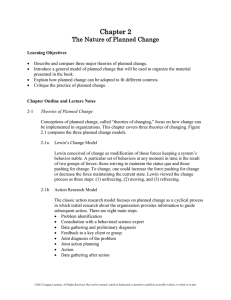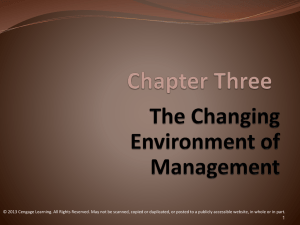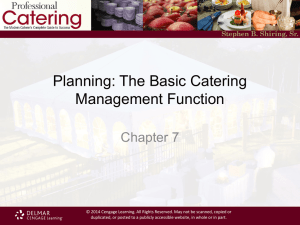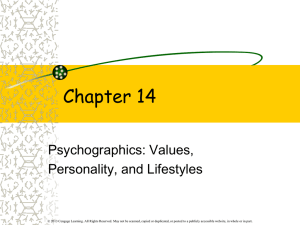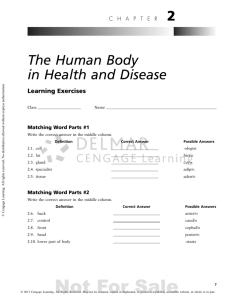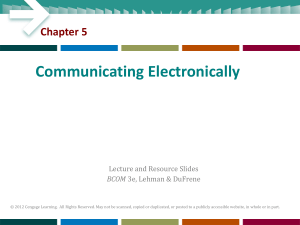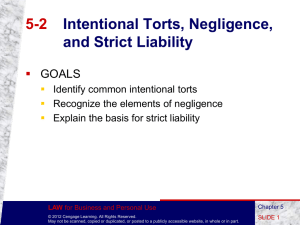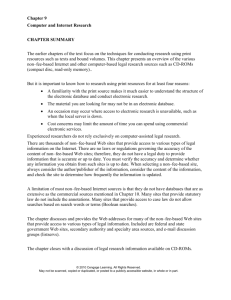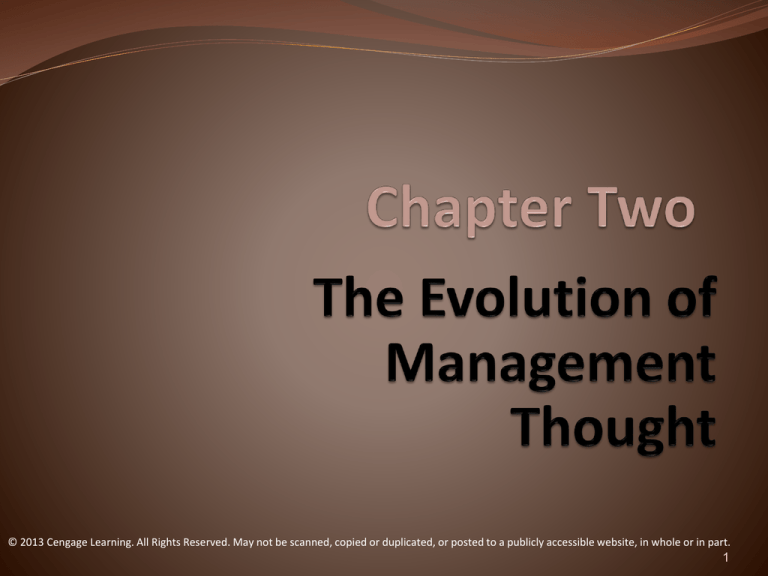
© 2013 Cengage Learning. All Rights Reserved. May not be scanned, copied or duplicated, or posted to a publicly accessible website, in whole or in part.
1
Chapter Objectives
Identify and understand the FIVE different approaches
to management
Describe the general aim of the human relations
movement and explain the circumstances in which it
arose.
Explain the practical significance of adopting a
contingency perspective.
© 2013 Cengage Learning. All Rights Reserved. May not be scanned, copied or duplicated, or posted to a publicly accessible website, in whole or in part.
2
The Practice and Study of Management
The systematic study of
Cultural anthropology
management did not begin
in earnest until after 1900.
The Egyptian pyramids
required managed effort
100k people over 20 years to
construct!
Study of management
includes:
Philosophy
Stats
Political science
Economics
Logistics
History
Computer science
Psychology
Sociology
© 2013 Cengage Learning. All Rights Reserved. May not be scanned, copied or duplicated, or posted to a publicly accessible website, in whole or in part.
3
No Universally Accepted Theory of
Management
There are several approaches to the theory and
practice of management. We will look at FIVE:
The universal process approach
The operational approach
The behavioral approach
The systems approach
The contingency approach
© 2013 Cengage Learning. All Rights Reserved. May not be scanned, copied or duplicated, or posted to a publicly accessible website, in whole or in part.
4
1. The Universal Process Approach
Universal Process Approach
Assumes all organizations require the same rational
management process
Core management process remains the same regardless of
the purpose of the organization.
The management process can be reduced to a set of separate
functions and related principles.
© 2013 Cengage Learning. All Rights Reserved. May not be scanned, copied or duplicated, or posted to a publicly accessible website, in whole or in part.
5
2. The Operational Approach
The operational approach is a production-oriented
field of management dedicated to improving
efficiency and cutting waste.
Finding the best way to do every job to get it done
faster and more efficiently.
Criticisms:
Treat people like mindless machines
Interested only in $$$
© 2013 Cengage Learning. All Rights Reserved. May not be scanned, copied or duplicated, or posted to a publicly accessible website, in whole or in part.
6
3. The Behavioral Approach
The Human Relations Movement
An effort to make managers more sensitive to their
employees’ needs
People need to be the central focus of an organization
Human Relations Movement:
Fear of unions forming
Success depends on motivated and committed employees
© 2013 Cengage Learning. All Rights Reserved. May not be scanned, copied or duplicated, or posted to a publicly accessible website, in whole or in part.
7
Organizational Behavior
Organizational Behavior (part of behavioral approach)
A modern research-oriented approach seeking to
discover the causes of work behavior and to
develop better management techniques
Lessons from the Behavioral Approach
People are the key to productivity.
Success depends on motivated and skilled individuals
committed to organizational objectives.
Managerial sensitivity to employees is necessary to
foster the cooperation needed for high productivity.
© 2013 Cengage Learning. All Rights Reserved. May not be scanned, copied or duplicated, or posted to a publicly accessible website, in whole or in part.
8
4. The Systems Approach
A system is a collection of parts operating
interdependently to achieve a common purpose
In the systems approach:
The whole is greater than the sum of its parts
Seeks to identify all parts of an organized activity and
how they interact.
Greater appreciation for the whole picture
Manager can’t become preoccupied w one area of
organization while ignoring others
© 2013 Cengage Learning. All Rights Reserved. May not be scanned, copied or duplicated, or posted to a publicly accessible website, in whole or in part.
9
5. The Contingency Approach
A research effort to determine which managerial practices
and techniques are appropriate in specific situations.
(The term contingency refers to the choice of an alternative course of
action.)
Contingency management has become synonymous with
situational management.
Application of management tools and techniques must be
appropriate for the particular situation.
Lessons from the Contingency Approach
Approach emphasizes situational appropriateness rather
than rigid adherence to universal principles
© 2013 Cengage Learning. All Rights Reserved. May not be scanned, copied or duplicated, or posted to a publicly accessible website, in whole or in part.
10



